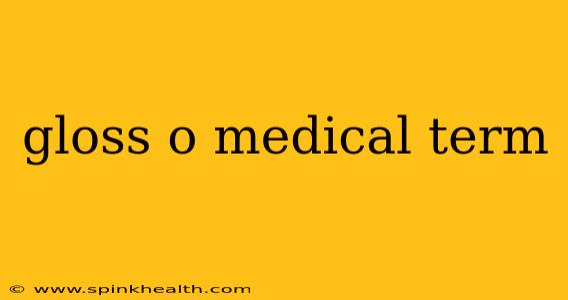Decoding the Enigma: A Deep Dive into the Medical Term "Gloss-"
The prefix "gloss-" in medical terminology might seem cryptic at first glance, but understanding its origins and applications unlocks a deeper understanding of various medical conditions. It's a journey into the fascinating world of medical etymology, where seemingly simple prefixes hold the key to complex diagnoses.
Our story begins with the ancient Greek word "γλῶσσα" (glossa), meaning "tongue." This seemingly simple word forms the foundation for a surprising number of medical terms, most commonly related to the tongue itself, but also extending to other areas with similar characteristics. Think of a tongue's role in taste, speech, and even swallowing – these functions help illustrate the breadth of "gloss-" terminology.
What does Glossodynia mean?
Glossodynia, one of the most common terms using this prefix, refers to pain in the tongue. This isn't just any pain; it can range from a mild discomfort to a severe, burning sensation. Imagine the frustration of a simple act like eating becoming excruciating due to this condition. The causes can be varied, from nutritional deficiencies to oral thrush or even side effects from certain medications. Understanding the underlying cause is key to effective treatment.
What are some other conditions related to the term "Gloss-"?
Beyond glossodynia, the "gloss-" prefix finds its way into other significant medical terms. Let's explore a few:
-
Glossitis: This term denotes inflammation of the tongue. Picture the tongue swollen, red, and potentially painful – a condition that can significantly impact daily life. Like glossodynia, glossitis can have multiple causes, ranging from infections to deficiencies in B vitamins.
-
Glossopathy: This encompasses any disease or disorder affecting the tongue. It serves as a broad umbrella term, encompassing a variety of conditions, from the previously mentioned glossitis and glossodynia to more unusual presentations.
-
Lingual: While not directly using "gloss-," the term "lingual" is often used interchangeably and stems from the Latin word for tongue. This emphasizes the interconnectedness of related terminology.
How common are these conditions?
The prevalence of conditions involving the "gloss-" prefix varies. Glossodynia, for example, is relatively common, affecting people of all ages and backgrounds. Glossitis is similarly prevalent, often associated with other oral health issues. The rarity of other "gloss-" related conditions depends heavily on their specific nature.
What are the treatments for conditions involving "gloss-"?
Treatment for conditions prefixed with "gloss-" depends entirely on the underlying cause. For example, nutritional deficiencies might require dietary adjustments or supplements. Infections may call for antifungal or antibiotic treatment. Pain management might involve topical anesthetics or oral medications. A thorough diagnosis from a medical professional is crucial for determining the appropriate course of action.
Conclusion: Unraveling the Mysteries of Medical Terminology
The seemingly simple prefix "gloss-" offers a window into the complexity of medical terminology. By understanding its roots and its various applications, we gain a deeper appreciation for the precision and detail within medical descriptions. Remember, if you experience any pain or discomfort in your tongue, it's always best to consult a medical professional for an accurate diagnosis and appropriate treatment. Never self-diagnose based on online information alone.

